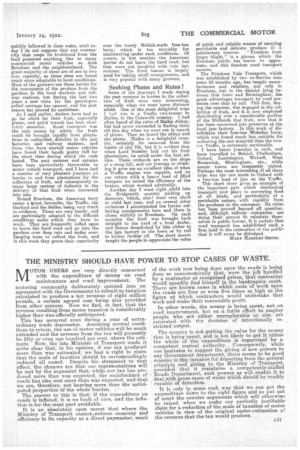THE MINISTRY SHOULD HAVE POWER TO STOP CASES OF WASTE. ,••
Page 27

If you've noticed an error in this article please click here to report it so we can fix it.
MOTOR USERS are very directly concerned with the expenditure of money on road maintenance and road improvement. The motoring community deliberately entered into an agreement with the Government to submit to taxation calculated to produce a net revenue of eight million pounds, a -certain agreed sum being also provided from other sources. Now we find, in fact, that the revenue resulting from motor taxation is considerably higher than was officially anticipated. This has occurred even during a year of extraordinary trade depression. Assuming normal conditions to return, the use of motor vehicles-will be much extended and the revenue from the tax will presently be fifty or even one hundred per cent. above the estimate. Now, the late Minister. of Transport made it quite clear that, in his opinion, if our tax produced more than was estimated, we had a right to claim that the scale of taxation should be correspondingly reduced all round. Despite his statenient to that effect, the chances are that ourrepreaentations be met by the argunient that, while out tax has produced more than was expected, the maintenince of roads has alto cost more thin was expected, and that we are, therefore, not bearing more than the anticipated proportion of the whole burden. . The answer to this is that if the expenditure on roads is inflated, it is no fault of ours, and the inflation is for the most part avoidable. It is an absolutely open secret that where. the Ministry of Transport cannot zenforce economy and efficiency in its capacity as a direct paymaster, much of the work now being done upon the roads is being done so uneconomically that, were the job handled by a contractor at recognized prices, that contractor would speedily find himself in the bankruptcy court. There are known cases in which costs of work tip'on the roads are four or even five times as high as the figure at Which contractors would undertake that work and make their reasonable profit. In other words, the money is being spent, not. on road improvement, but on a futile effort to employ people who are either unemployable or else are saturated with the doctrine of intentionally restricted output. The country is not getting the value for the money that is being spent, and is not likely to get it unless the whole of the expenditure is supervised by a competent central authority. Consequently, while one hesitates to suggest the giving of new powers to any Government department, there seems to be good reasons in t stance for departing from the general principle and givmg to the Ministry of Transport, _ . , provided that it maintains a competently-staffed -Roads Department, such powers as will enable it to deal with gross cases of waste which should be readily capable of 'detection. it is only in some such way that we can get the expenditure down to the right figure and so put out of court the counter arguments which will otherwise be raised, when we make our perfectly justifiable claim for a reduction of the scale of taxation of motor vehicles in view of the original under-estimation o"the revenue that the tax would produce.






























